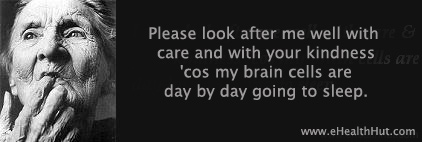
Contents
- What Causes Alzheimer’s Disease?
- Symptoms of Alzheimer’s disease
- Medication
- Ten Warnining Signs Of Alzhemier’s Disease
What Causes Alzheimer’s Disease?
Alzheimer’s disease is a type of ‘dementia’. This term refers to a brain disorder that seriously affects a person’s ability to carry out daily activities. All of the known types of dementia involve disease processes that destroy brain cells. Alzheimer’s disease involves the parts of the brain that control thought, memory, and language. Although is known that the disease process involves the appearance of abnormal clumps (amyloid plaques) and fibers (neurofibrillary tangles) in the brain of a person with Alzheimer’s disease, to date the cause of the condition has not been discovered, and there is no known cure.
Symptoms of Alzheimer’s disease
People over 35 years of age who have lapses of memory should not assume that they are in the early stages of Alzheimer’s disease. We all have memory lapses now and then!
Mild Symptoms
- The following are symptoms that are used to describe mild. Moderate, and severe forms of the disease:
- Confusion and memory loss
- Disorientation of getting lost in familiar surroundings
- Changes in personality and judgment
Moderate Symptoms
- Difficulty with the activities of daily living such as bathing and feeding
- Anxiety, suspiciousness, agitation, or depression
- Problems with sleeping Wandering or pacing
- Difficulty recognizing family and friends
Severe Symptoms
- Loss of speech
- Loss of appetite and weight loss
- Loss of bladder and bowel control
- Total dependence on others for daily living
Symptoms of Alzheimer’s disease vary from person to person but do gradually get worse over time.
Diagnosis of the disease is made by excluding other causes of dementia (blood and urine tests), medical history, neuropsychological tests (i.e. memory, problem solving, attention, counting, and language), and brain scans.
Medication
Since no cure has been found for Alzheimer’s disease to date, medication is aimed at slowing down the progression of symptoms of the disease. The three currently available prescription medication approved for treatment of Alzheimer’s disease (donepezil, rivastigmine, galantamine) work by preventing the breakdown of the chemical acetylcholine in the brain. The brain uses acetylcholine to relay messages, especially those needed for activities involving memory, reasoning and learning. For an unknown reason, people with Alzheimer’s disease have less of this important chemical in their brains.
- The effectiveness and duration of activity of each of the medications varies from person to person
- Donepezil, rivastigmine, and galantamine are intended for use by people with mild to moderate forms of Alzheimer’s disease
- All of these medications may take up to 12 weeks to begin working (medication needs to be taken every day to be effective)
IT’S IMPORTANT
FOCUSING ON FACT – NOT FICTION
Alzheimer’s disease is misunderstood by many people. For example:
- The onset of Alzheimer’s disease is not a normal part of aging. It is a disease process, which strikes more often in seniors.
- There is a greater risk for developing Alzheimer’s disease if a parent or brother or sister have the disease, but the greater risk factor is increasing age. A rare form of the disease known as ‘early-onset Alzheimer’s’ affects people between 30 and 50 years of age and is directly inherited.
- Many believe aluminum to be a cause of Alzheimer’s disease. However, sufficient evidence has not been found to link this element with Alzheimer’s disease or other dementias.
- There is no evidence to suggest that artificial sweeteners, including aspartame, cause memory loss.
Early diagnosis of Alzheimer’s disease is important and allows for care, information, and support to be received as quickly as possible.
Ten Warnining Signs Of Alzhemier’s Disease
- Memory loss – consistent and getting worse over time
- Difficulty performing familiar tasks
- Problems with language – forgets simple words
- Disorientation to time and place
- Poor or decreased judgment
- Problems with abstract thinking
- Misplacing things – e.g. putting keys in freezer
- Changes in mood or behaviour – rapid mood swings
- Changes in personality – e.g. suspicious, fearful
- Loss of initiative
Written by: Winter Rose
Copyright © by www.siyalla.com
[Earlier our website was www.ehealthut.com]

